WASHINGTON, Dec. 27 (Xinhua) -- From gravitational waves seen in neutron star collision to life-saving gene therapy, the year of 2017 has seen major science breakthroughs, trends and events that will potentially shape the future of human life.
Following are ten science events, which have major impact on the world in 2017, and for many years to come.
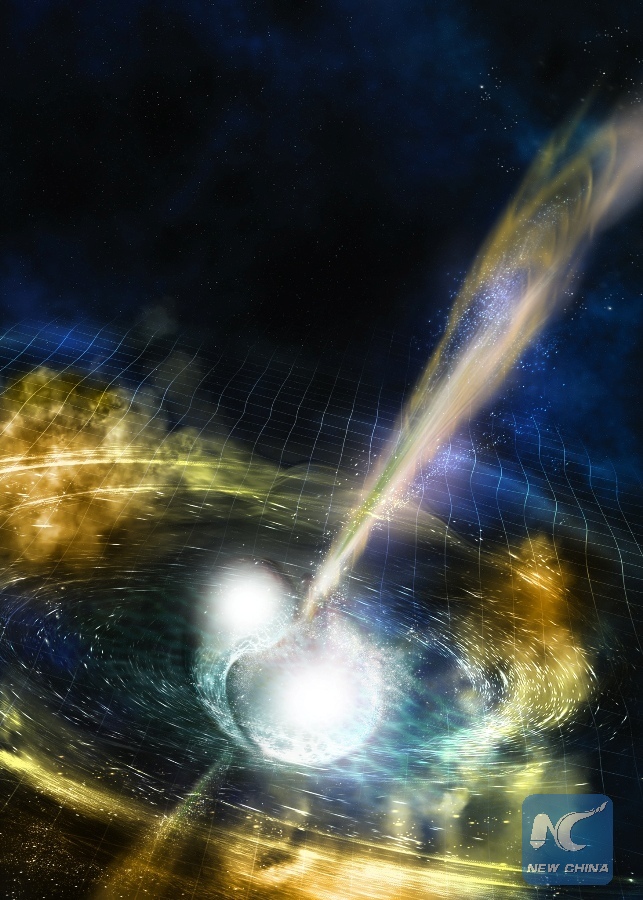
Illustration Image shows two merging neutron stars. The narrow beams represent the gamma-ray burst while the rippling spacetime grid indicates the isotropic gravitational waves that characterize the merger. Swirling clouds of material ejected from the merging stars are a possible source of the light that was seen at lower energies. Scientists announced Monday that they have for the first time detected the ripples in space and time known as gravitational waves as well as light from a spectacular collision of two neutron stars. (Xinhua/National Science Foundation/LIGO/Sonoma State University/A. Simonnet.)
GRAVITATIONAL WAVES USHER IN NEW ERA FOR ASTRONOMY
On Aug. 17, scientists detected gravitational waves -- the ripples in space and time, and light from the collision of two neutron stars. It was the first time a cosmic event has been "seen" from Earth in both gravitational waves and in light. In other words, the event helps to bring together traditional light-based astronomy with gravitational wave astronomy for the first time.
LIFE-SAVING GENE THERAPY WITH HEFTY PRICE TAGS
Decades of research on gene therapy is finally paying off. The U.S. Food and Drug Administration (FDA) approved not one but three life-saving gene therapy products this year.
Kymriah, known as "a living drug," and designed for children and young adults, uses a patient's own immune system cells, called T cells, after these cells have been modified to better recognize and kill the patient's cancer. The one-time drug is now priced at 475,000 U.S. dollars.
Yescarta, a similar gene therapy, to treat adult patients with certain types of large B-cell lymphoma. It is similarly expensive at 373,000 dollars.
Then Luxturna, reportedly with a possible price tag of as high as one million dollars, delivers a normal copy of the mutated gene directly to retinal cells, leading them to produce a key protein that converts light to an electrical signal in the retina to restore patient's vision loss.
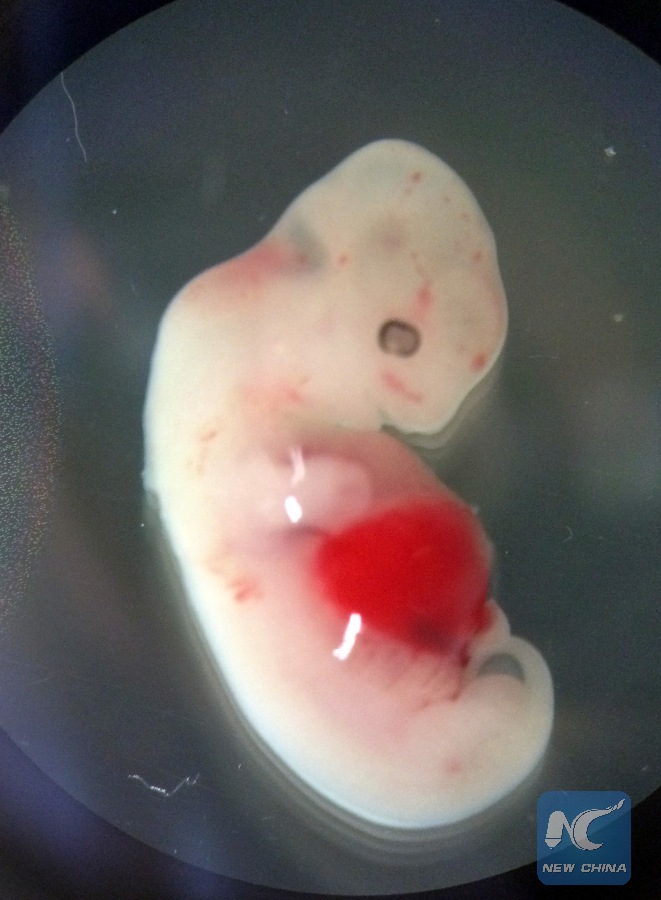
Undated photo released by U.S. Salk Institute on Jan. 26, 2017 shows a 4-week-old pig embryo containing human cells. In a bold but potentially controversial quest for solutions for the worldwide shortage of transplant organs, scientists attempting to grow human organs inside pigs have successfully grown the first chimera embryos containing cells from both humans and pigs, they said Thursday. (Xinhua/U.S. Salk Institute)
CRISPR GENE EDITING SPEEDS INTO CLINIC AMID ETHICS DEBATE
The revolutionary gene-editing technology CRISPR is moving rapidly into the clinic, with a report from the U.S. National Academies of Sciences, Engineering and Medicine recommending in February that clinical trials for gene editing of a human embryo "could be permitted in the future, but only for serious conditions under stringent oversight."
Scientists have also made breakthroughs in their quests for solutions for the worldwide shortage of transplant organs. In January, U.S. researchers announced they have used CRISPR to successfully create the first human-pig chimera embryos, bringing us a step closer to growing human organs inside pigs. In August, researchers from the U.S., China and Denmark reported that they have edited the pig genome to deactivate a family of retroviruses in order to create piglets that can't pass the viruses on to transplant recipients.
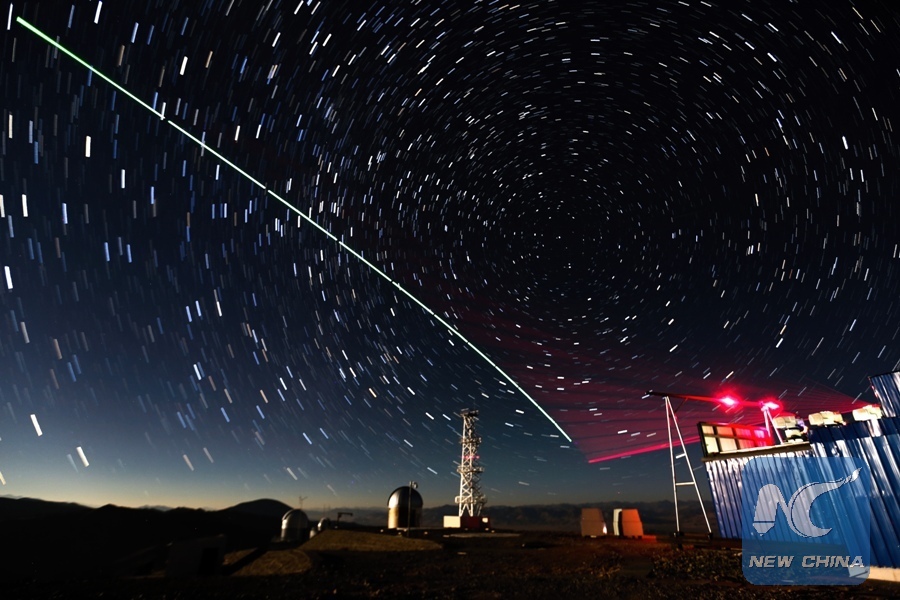
Composite photo taken on Dec. 9, 2016 shows a satellite-to-earth link established between quantum satellite "Micius" and the quantum teleportation experiment platform in Ali, southwest China's Tibet Autonomous Region. (Xinhua/Jin Liwang)
BRIGHT FUTURE FOR QUANTUM COMMUNICATIONS & QUANTUM SUPREMACY
The past year has also seen a series of major advancements in quantum communications, which are currently described as "unhackable."
In June, Chinese researchers announced that they had transmitted pairs of "entangled" photons from the Micius satellite to two ground stations located more than 1,200 kilometers apart. Previous efforts to entangle quantum particles, such as photons, have been limited to about 100 kilometers.
In August, China inaugurated the world's first line of quantum communications between the cities of Beijing and Shanghai, which covers a total length of over 2,000 kilometers. "We hope to form a ground and space integrated quantum communications network in about 10 years, and apply it widely in fields such as national defense, government affairs, finance and energy," Pan Jianwei, lead scientist of the Micius project, said earlier this year.
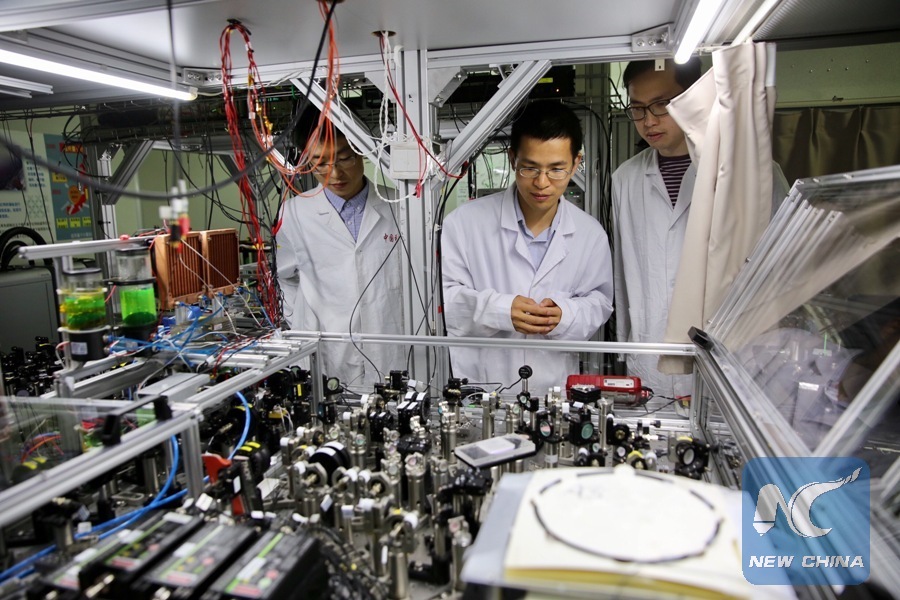
Professor Lu Chaoyang (C) of the University of Science and Technology of China checks the operating status of the quantum computing machine with his students at a lab in Shanghai, east China, May 3, 2017. Chinese scientists have built the world's first quantum computing machine that goes far beyond the early classical -- or conventional -- computers, paving the way to the ultimate realization of quantum computing. (Xinhua/Jin Liwang)
Meanwhile, Google, IBM and several other tech giants are now in a seemingly tight race for quantum supremacy, a state which allows quantum computers to beat even the strongest supercomputers.
In November, IBM announced that it has successfully developed and tested an operational prototype processor that handles 50 qubits, which are believed able to exhibit what's known as "quantum supremacy."
Google was reportedly to unveil a 49-qubit device soon. Intel is also betting on a quantum-enabled future, with the revelation of a 17-qubit processor in October. There are also many other groups around the world pursuing different approaches to achieve the "supremacy."
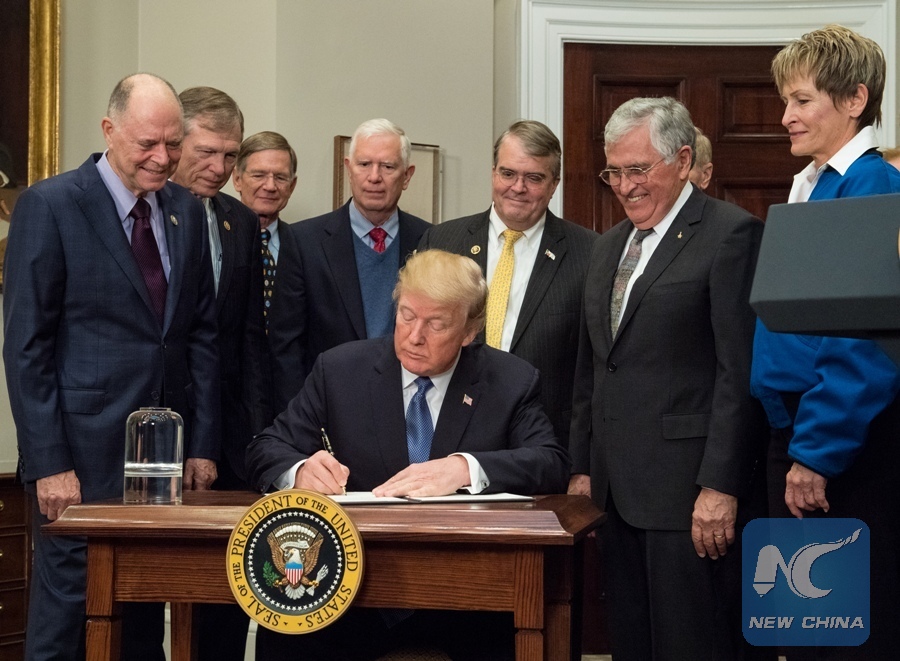
Photo released by NASA on Dec. 11, 2017 shows U.S. President Donald Trump (front) signing the Space Policy Directive 1 at the White House in Washington D.C., the United States, on Dec. 11, 2017. (Xinhua/NASA/Aubrey Gemignani)
ASTRONAUTS SET TO GO BACK TO MOON
In July of 1969, the U.S. space agency NASA succeeded in sending astronauts to the moon. About half a century later, U.S. President Donald Trump instructed NASA to do so again, with an alleged goal of laying a foundation there for an eventual mission to Mars.
The Trump administration has not yet laid out a detailed plan for returning Americans to the lunar surface, but NASA is exploring a concept of building a small space station around the moon known as Deep Space Gateway that would serve as a waypoint to the lunar surface and deep space.
China, the third country which has independently sent humans into space, is also working on an idea for manned lunar landing.
According to Wu Yansheng, general manager of China Aerospace Science and Technology Corporation (CASC), the mission will consist of a manned spaceship, a propulsion vehicle and a lunar lander. The manned spaceship and the lunar lander will be sent into circumlunar orbit separately.

Chinese Go player Ke Jie analyses the game after the second match against artificial intelligence program AlphaGo in Wuzhen, east China's Zhejiang province, May 25, 2017. (Xinhua/Xu Yu)
ARTIFICIAL INTELLIGENCE COMES OUT OF LAB
Artificial intelligence (AI) is not only challenging and defeating human players in the ancient Chinese board game Go, it's also predicted to penetrate and even transform industries from manufacturing and transportation to finance and healthcare.
And scientists scouring data from NASA's Kepler Space Telescope even used AI to discover an eighth planet around a star 2,545 light years away this year, making the distant solar system the only one besides our own that has eight planets orbiting a single star.
By 2025, annual worldwide AI revenue will grow to 89.8 billion dollars, according to Tractica, a U.S. market-intelligence firm, an increase from only 3.2 billion dollars in 2016.
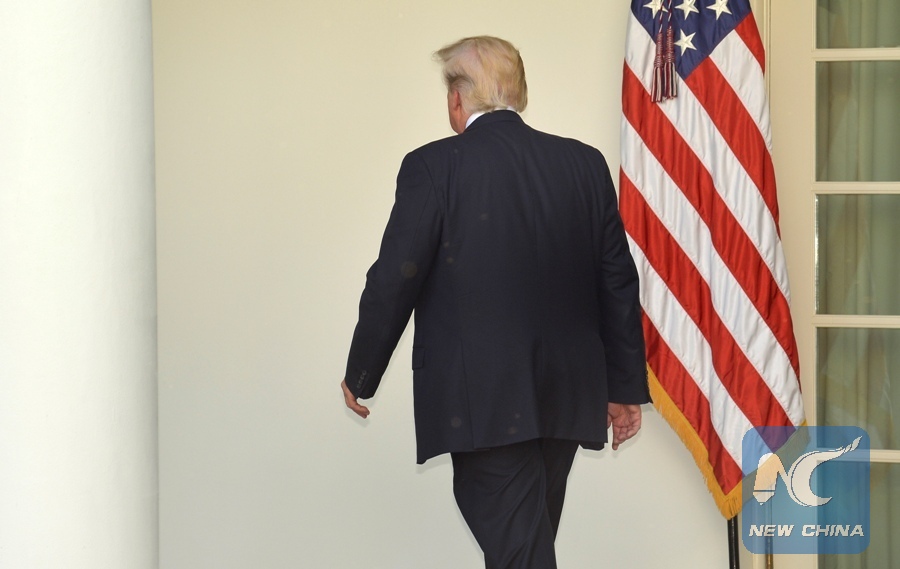
U.S. President Donald Trump leaves after delivering a speech at the White House in Washington D.C., capital of the United States, on June 1, 2017. U.S. President Donald Trump said on Thursday that he has decided to pull the United States out of the Paris Agreement, a landmark global pact to fight climate change. (Xinhua/Mike Theiler)
U.S. WITHDRAWS FROM PARIS AGREEMENT ON CLIMATE CHANGE
Climate change has become a global challenge that requires action from all countries across the world. But to the regret of almost all, Trump Administration announced in June that his country would withdraw from the Paris Agreement on climate change, which is regarded by many as the "best chance we have to save the planet."
The Paris Agreement, agreed on by almost every country in the world in 2015, aims to tackle climate change by cutting greenhouse gas emissions and sets a global target of keeping the average temperature rise no higher than 2 degrees Celsius above pre-industrial levels.
In the face of the U.S. change of heart over the landmark deal, other major players including the European Union, China and India have reiterated their willingness to step up efforts to tackle the climate change.
NEW CANCER DRUG DEFEATS MULTIPLE TUMORS
In May, the U.S. FDA granted accelerated approval to a treatment for patients whose cancers have a specific genetic feature. This is the first time the agency has approved a cancer treatment based on its DNA rather than the location in the body where the tumor originated.
The drug, called Keytruda, which has previously been approved to treat metastatic melanoma and a handful of other tumor types, can now be prescribed for any advanced solid tumor that carry a common genetic defect referred to as microsatellite instability-high or mismatch repair deficient.
FIRST GENETICALY-MODIFIED ANIMAL HITS SHELVES IN CANADA
AquaBounty Technologies, a U.S.-based biotechnology company, announced in August that it has sold approximately five tons of fresh genetically-modified (GM) salmon fillets at "market price" to unnamed customers in Canada.
"Our salmon is only approved for production, sale and consumption in the United States and Canada," Dave Conley, a company spokesman, told Xinhua at that time. "It will not be sold in China until it is approved by your national biotechnology regulatory authority."
"This is an important step for the company and for the technology as a whole," William Muir, genetics professor at the Purdue University, commented in an email to Xinhua. "This will be the first GM animal approved for human consumption and now the next step is consumer acceptance... I see no scientific reason to be concerned about the sale or consumption of AquaBounty GM salmon."
7 EARTH-SIZED EXOPLANETS DISCOVERED AROUND NEARBY STAR
NASA announced on Feb. 22. that a compact analogue of our innersolar system about 40 light years away from the Earth has been discovered.
"The discovery gives us a hint that finding a second earth is not just a matter of if but when," Thomas Zurbuchen, associate administrator of the Science Mission Directorate said.
An international team of astronomers using powerful space telescopes and ground-based observatories have discovered the first known system of actually seven Earth-sized planets orbiting the nearby TRAPPIST-1, which is relatively close to us, in the constellation Aquarius.
And three of these planets are firmly located in the habitable zone, the area around the parent star where a rocky planet is most likely to have liquid water.

